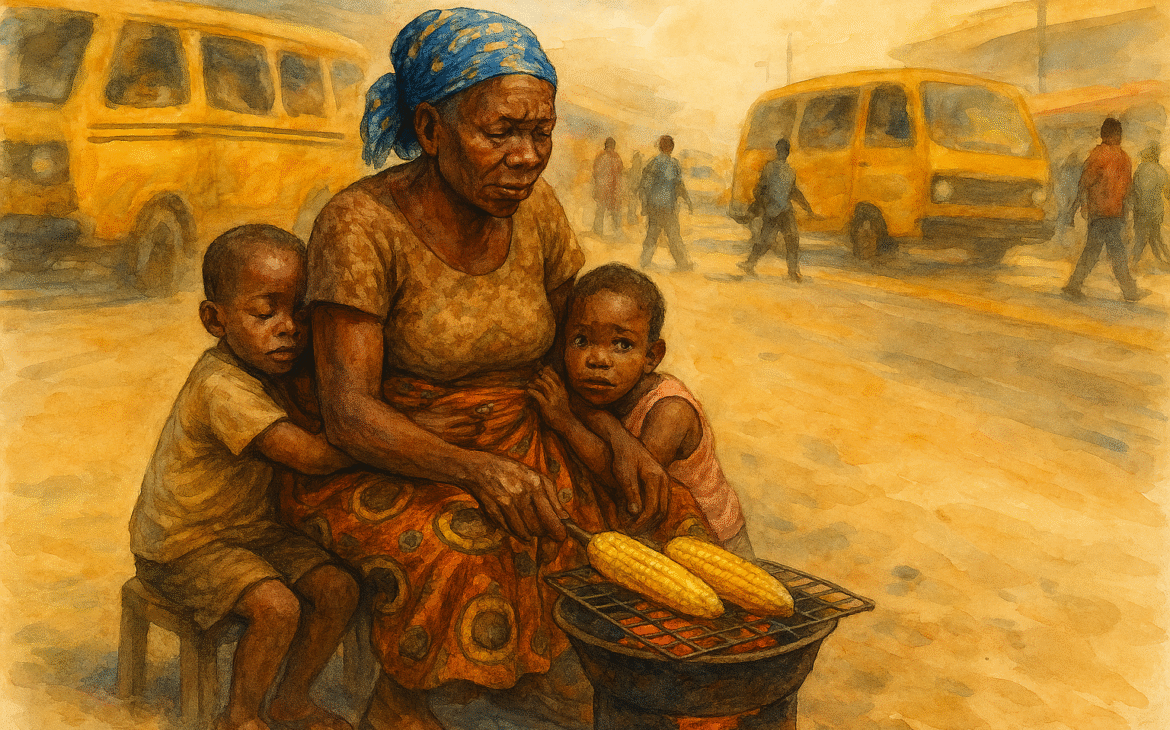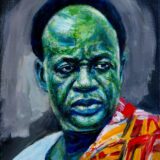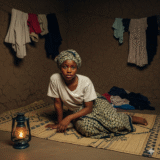Lasgidi
This is a work of fiction. Names, characters, businesses, places, events, and incidents are either the product of the author’s imagination or used in a fictitious manner. Any resemblance to actual persons, living or dead, or actual events is purely coincidental.

No one needed to tell Moria that this was Lagos. Everything was self-evident as soon as she looked out of the Boeing 747 window after touching down at Murtala Mohammed International Airport. Tried as she did, she couldn’t remember what the airport looked like when she had departed 27 years ago—on a stretcher, in pain. She said a little prayer, giving thanks as the doors opened and she stepped off the plane from the first-class compartment. Her heart pounded with a mix of excitement and trepidation. She did not know what to expect.
Would Denrele be there waiting for her? What if he is not? What would she do? She soon found herself at the immigration desk, where, because of her blue passport as a U.S. citizen, her processing was swift. And there he was—the man with the “luxurious white beard,” the identifying feature she had been told would make Denrele stand out. She had mused over this a few times. How could this be? Surely, he would not be the only one with a greying beard. But surprisingly, it was not difficult to spot him in the crowd. Of course, she was further helped by the fact that Denrele was holding a placard with her name boldly written on it.
She walked straight to him. “Hello, I guess you’re Mr. Denrele,” Moria said.
“Yes, ma, and welcome to Lagos. Please, call me Denrele. Most people do,” he responded. He ushered her to a private waiting area and asked for a description of her bags.
As the conveyor belt whirled to life, she spotted her luggage through the glass doors and pointed them out to Denrele. Soon, they were out of the airport with her luggage, and the humid air clung to her skin. For the first time, she missed the cold of Boston. Denrele directed her to the black Mercedes-Benz parked near the exit. He opened the door and ushered her into the comfortable black leather seats with red trims. She settled in, watching Denrele load her luggage into the boot before whisking her away to Ikoyi.
The drive from the airport was a sensory overload, though her view was obscured by the deep, dark tint of the windows—a feature meant to shield her from prying eyes. At Oshodi, the bustling market and transport hub, they were held up in traffic for a while, thanks to the numerous yellow buses with black mid-stripes, popularly called danfo, which had taken over more than two-thirds of the road, dropping off and picking up passengers.
In the distance, she caught sight of an older woman roasting corn on a tiny charcoal stove by the roadside, two young children clinging to her wrapper in the sweltering heat. The scene stirred something deep within her, she was saddened by it. What future awaits these children? She wondered silently.
On the Oworonshoki Expressway, Moria’s eyes caught sight of a motorcycle mounted on a pedestal, emblazoned with the image and name of “Charly Boy.” She chuckled to herself, remembering the eccentric persona.
At an intersection, a deep green road sign with white lettering indicated they were heading toward the Third Mainland Bridge. The traffic had thinned, and the SUV glided smoothly, with only a barely noticeable bump at the bridge’s expansion joints. The view was breathtaking. To her right, she glimpsed a sprawling set of buildings with a lush, verdant stretch that stood apart from the others in the area. If she were a Lagosian, she would have easily identified this as the Lagoon Front of the University of Lagos.
Passing this area, the lagoon itself stretched out, dotted with wooden stilt houses clustered together like a floating village. Moria’s curiosity was piqued.
“Please, where is that?” she asked the Denrele, breaking the silence that had enveloped the car since they left the airport.
“Oh, Makoko,” he replied, his voice calm and measured. Denrele was a man of few words, though his presence was a reassuring constant throughout the journey. Makoko fascinated her. The stilt houses, the tree logs floating on the lagoon—it was a world unto itself. She had seen similar structures in the swamps of Louisiana, but this felt different.
They finally arrived at the gate of an expansive property in Ikoyi and for a split second, she thought she had been transported back to Boston. The shimmering glass buildings, the manicured gardens, the immaculate roads—the contrast was jarring compared to most of what she had seen on the trip.The car pulled into the underground parking lot of a 15-story glass-panelled building. Denrele parked next to the elevator pressed a sequence of numbers on the keypad and opened the SUV door for her. “Ma, the elevator will take you to the penthouse. I’ll be up shortly with your luggage,” he said.
Moria stepped into the elevator and gasped. The interior was a vision of gold, pristine and gleaming, without a single fingerprint or speck of dust in sight. It ascended swiftly, and within moments, she found herself standing before a tall, ornate white door. As she approached, it swung open of its own accord, revealing a penthouse that was nothing short of breathtaking.
She wasn’t expecting to meet anyone; no one lived here, she had been told. The apartment belonged to a friend of a friend, a man she had never met but who had generously offered her the space during her stay in Lagos. Caleb, her connection back in Boston, had arranged it all. The owner lives in Edinburgh and visits Lagos sparingly but wouldn’t sacrifice his taste when he did. He found most hotels inconvenient and had kept this penthouse apartment to avoid such discomfort. During their only conversation while she was still in Boston, he had told her, “You are free to stay as long as you please, Moria. Caleb’s friend is my friend, and Caleb has told me a lot about you.”
Moria remembered how embarrassed she had been on that call. Caleb hadn’t told her much about this friend, and she had missed his name due to the guttural sound when she picked up. She made a mental note to deal with Caleb in her way the next time she sees him.
At the penthouse, Moria took a moment to soak it all in before heading to the shower. While in the shower, she could hear Denrele bringing in her luggage and letting himself out of the apartment. Her thoughts turned to the week ahead. She had come to Lagos with a purpose: to reconnect with her roots and gather material for the story she was writing about the Agbekoya Uprising, she has a tangled connection with the event to which she owes her present circumstance in life.
Her chance encounter with Erik Johansson had ignited a fire in Moria. She was now more determined than ever to uncover the truth about the Agbekoya unrest—what happened, why, and who was responsible. To her, history wasn’t a static, dusty subject; it was a living, breathing story waiting to be told. Her brief stay in Ikoyi wasn’t for leisure; it was to solidify her plans, confirm appointments, and forge connections that would illuminate her path.
With a glass of 2000 Château Margaux in hand, wrapped in a silky white robe, she sat at the balcony of the penthouse, gazing out at the lagoon with its waters gently lapping against the sides of the building. Moria felt a sense of belonging she had not realised she had been missing. Lagos was chaotic, unpredictable, and a little overwhelming, but it was also vibrant, alive, and full of possibilities. For the first time in years, she felt truly at home.
The journey ahead would take her to Ibadan, where she would meet Mulika. Moria knew that seeing her old friend would unlock forgotten memories and help her fill in the gaps in her search for the truth. She had changed, and she knew Mulika must have too. Moria remembered Mulika’s beauty, innocence, and brilliance, and silently hoped that she had retained those qualities. While their recent phone calls hadn’t revealed much about the first two, Mulika’s sharp intellect was still very much on display.
Moria’s thoughts drifted to Ibadan itself. After nearly three decades away, how much would it have changed? Would the vibrant stalls at Mapo still be there? What about her parents’ old rented room? Her school, the vicar at Mapo Christ Church? She had so many questions, and this trip would hopefully answer them all.
For now, she allowed herself a moment of quiet reflection, savouring the sights and sounds of Ikoyi. As the sun dipped below the horizon, painting the sky in hues of orange and pink, Moria smiled. She was ready to embrace whatever came next, knowing that her story was just beginning.
A fleeting thought of her successful realtor business crossed her mind. Would anything need her personal attention? She quickly dismissed the idea, confident that her assistant, Lucy, was more than capable of handling things. This trip was also a test, a chance to prove the business could thrive without her constant presence.




Ohanugo Ernest
You description is very apt. Capturing the different places from the airport to Ikoyi.
You are sure great story teller. Waiting for the next chapter
Joe
Almost missed this chapter; 1 day behind but rolling over to the next…👍
Blessing
The fact that I could relate to the mentioned places makes the story real.
The detailing is jaw-dropoing.
Williams D Kareem
Nice one!